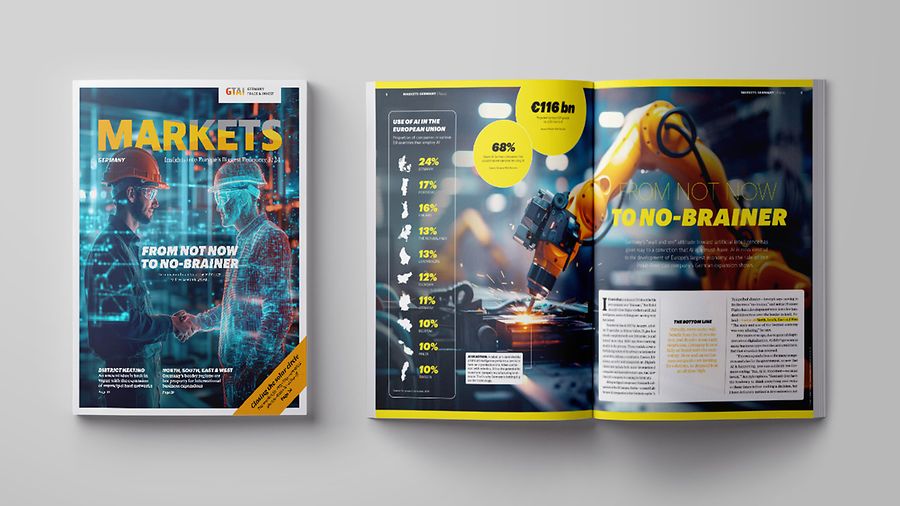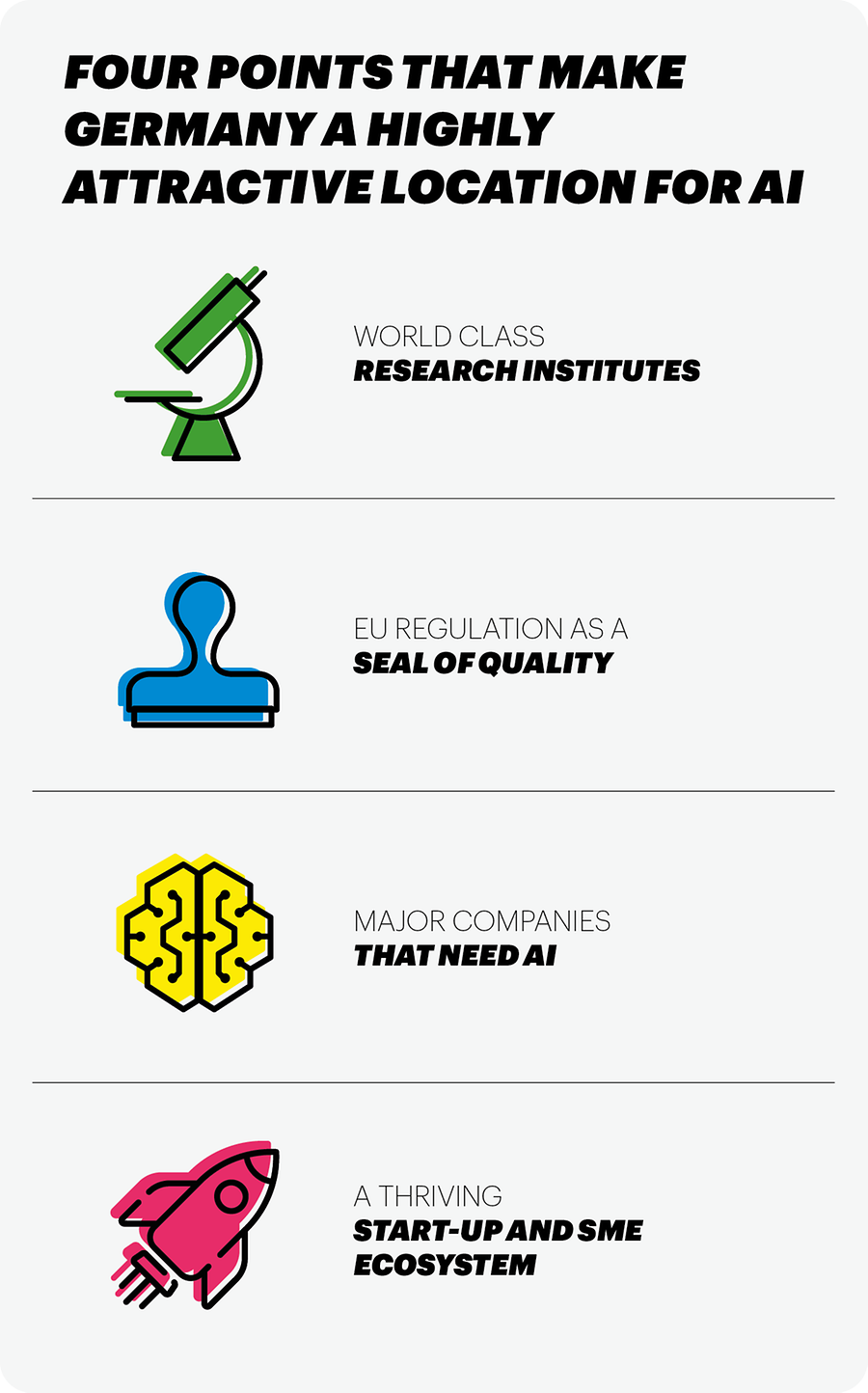Markets Germany Magazine 3/24 | Artificial Intelligence
From Not Now to No-Brainer
Germany’s “wait and see” attitude toward artificial intelligence has given way to a conviction that AI is a must-have. AI is now central to the development of Europe’s largest economy, as the tale of one Polish-American company’s German expansion shows.
Nov 13, 2024
It’s not often you hear a CEO describe his own company as a “dinosaur,” But Rafal Janczyk’s firm Digica works in artificial intelligence, and in AI things are moving very fast indeed.
Founded in March 2017 by Janczyk, a Polish IT specialist, in Silicon Valley, Digica has already completed well over 200 projects and trained more than 3600 machine-learning models in the process. Those models cover a bewildering variety of AI software solutions for automotive, defense, e-commerce, finance, life science, security and transportation. Digica’s clients now include both major international companies and innovative start-ups. And now Janczyk’s company is coming to Germany.
“I have noticed a determination in Germany not to miss out on the AI boom.”
RAFAL JANCZYK, CEO of AI company Digica
Sitting in Digica’s temporary German headquarters at the AI Campus, Berlin—a smart hub for new AI companies in the German capital’s Tempelhof district—Janczyk says moving to Berlin was a “no-brainer,” and not just because Digica has a development team just a few hundred kilometers over the border in Łódź, Poland. “The scale and size of the German economy was very alluring,” he says.
Five years or so ago, due to general skepticism about digitalization, AI didn’t generate as many business opportunities as it could have. But that situation has reversed.
“This was a painful lesson for many companies and also for the government, so now that AI is happening, you can suddenly see Germans saying: ‘Yes, AI is important—we must invest,’” Janczyk explains. “Germany does have the tendency to think everything over twice or three times before making a decision, but I have definitely noticed a determination not to miss out on the AI boom. They might have missed the first train, but they won’t miss the next one.” And the good news is, the initial skepticism means there is now additional room for growth.
Digica’s expansion story was almost derailed by the coronavirus pandemic. “We had a team of 25 people and many customers, and then Covid started, and we almost went bankrupt,” recalls Janczyk. Luckily, the company was already strong enough to attract significant investment from a UK investor. “This meant I could spread out wings,” he says. “So from a team of 25 people we grew to almost 100 just within two years.”

This article was published in issue 3-2024 of the Markets Germany Magazine. Read more articles of this issue here
The courage to use AI
Digica’s business development strategy in Europe offers a useful snapshot of future of AI in Europe’s largest economy. The company is currently focused on attracting two main types of clients: companies in medtech and in defense. Both are sectors where Germany has many major players and where there is growing interest in finding AI solutions to gain a competitive advantage.
The Bottom Line
Virtually every sector will benefit from the AI revolution, and despite some early skepticism, Germany is now fully on board with the technology. More and more German companies are looking for solutions, so demand is at an all-time high.
“These are two very different fields, but they are the two that have enough data, enough money and enough courage to use AI,” says Janczyk. “They are very determined to put AI into use cases and into production.”
Germany, like many European countries, is currently bolstering its defense budget—and it is Janczyk’s conviction that a significant part of that will be funneled into developing intelligent defense systems.
“This is what we do super-effectively: provide radar technologies with AI systems, which are so much more accurate in identifying potential threats,” he says. “If you train and adjust the models well, you can distinguish between drones and different flying objects with a much higher accuracy.”
Another one of Germany’s main draws for companies like Digica is the strong manufacturing sector here. This, too, is an area where there are big players with money and ambition, and where processes can be significantly streamlined by machine learning tools.
“Manufacturing in Germany is on a super-intense level,” says Janczyk. “But all the automation that was introduced years ago can be improved by adding the AI factors.” He points to one tool that Digica developed for a major German steel manufacturer: an AI model to detect cracks in steel as it is cooling down, rather than waiting until cooling is finished. This potentially saves hundreds of thousands of euros in costs and energy.
At the moment, Janczyk is the company’s only employee in Berlin—but he won’t be for long. Digica is beginning to recruit talent from throughout Germany. “If you look at the school system here, they produce enough people with good skills,” he says.

Big projects for specific needs
Digica’s expansion into Germany is part of a wider trend. Some of the world’s biggest players are investing big in the country’s digital business future, of which AI is now an integral part. In June 2024, Amazon announced it was putting a further EUR 10 billion into its German operations, taking its total investment in Europe’s biggest economy to EUR 77 billion since 2010.
Amazon knows better than anyone how big the potential here in Germany is—because it’s done the research. According to a recent study by Amazon Web Services (AWS) and Strand Partners, AI could add an additional EUR 116 billion to the German economy by 2030. The same study also found that 68 percent of German companies could improve their turnover by introducing AI technology.
Amazon has chosen Germany as the home of its AWS European Sovereign Cloud. This is essentially a vast data processing hub designed to help customers from the public sector and in highly regulated industries—for example, critical infrastructure operators —meet specific legal requirements regarding the location of data processing and digital operations.
Jonathan Weiss, MD at the Amazon Development Center Germany, says one of the main reasons Germany is so central to Amazon’s plans is the strength of the research centers. “Amazon has been investing in the development of AI for decades, and our research and development centers in Berlin, Tübingen and Aachen play a central role in that. AI research is firmly rooted here,” he says. “One of the main goals in Berlin is to make generative AI accessible to everyone via the Cloud.”
Keeping the data in Europe
The European Sovereign Cloud promises to be a big driver of growth for Germany’s AI sector, and Amazon is fully invested in its future.

“The AWS European Sovereign Cloud and the associated investments of around EUR 7.8 billion build on this long-term commitment to Germany,” says Weiss. “We are investing significantly in new talent and local infrastructure to support the need for digital sovereignty.”
AWS enables customers to combine the large available AI language models with their own data to obtain customized solutions for their specific challenges. The focus is on processing large amounts of data while maintaining security.
That latter point is important. The European Union’s AI Act is the world’s first regulatory framework for artificial intelligence, and data security tops the list of priorities. As Asha-Maria Sharma, an expert in digital & service industries at Germany Trade & Invest (GTAI), explains (see interview on p. 10), legal requirements actually represent an advantage, since internationally recognized standards will ultimately create more trust in AI products. AWS already has teams in place working on meeting those standards, especially in Berlin.
“In our offices in the capital, many highly talented data scientists work together to achieve this,” says Weiss. He highlights the generative AI assistant Amazon Q, developed in Berlin and available in Germany as of 2024. Amazon Q can generate code, test, debug, and has planning and reasoning capabilities that can transform and implement new code generated from developer requests.
Where is Germany on AI?
Asha-Maria Sharma, digital & service industries expert at Germany Trade & Invest on the AI landscape in Germany, gives a rundown of the regulatory framework and political climate.
Some experts say Germany and Europe in general are lagging behind the United States when it comes to the artificial intelligence market. Would you agree?
ASHA-MARIA SHARMA: Germany might look like it’s a bit behind, but the AI landscape has been evolving rapidly. In AI research and use cases in the manufacturing and health sectors, for example, Germany is a global leader. The challenge, as with all new technologies, is to find the right moment to commercialize. There are a lot of things happening here.
Since 2018 Germany has a national AI strategy that is constantly evolving. And there are unicorns in Germany too, like the generative AI specialist Aleph Alpha and the translation tool DeepL. The German AI industry association already has more than 400 member companies. As German companies increasingly use AI solutions, there is still a lot of space for new products and services in the domestic market.
At GTAI, we talk a lot to international mature start-ups and companies with AI products, and they are starting to see that, at various places along the value chain, there is a market for what they have to offer. There are a huge number of potential clients in nearly all industry verticals in Germany.
In May 2024, the EU introduced the AI Act, the world’s first comprehensive regulatory framework for AI, which is now being transferred into the national law of all the EU member states. What challenges and opportunities might this present for international companies?
AS: The rapid technological advancements have heightened concerns over personal data, human rights and democratic values when it comes to AI. The EU is not alone in regulating AI. The US also has some legislation governing risk management, and China, too, has come up with some administrative measures to cover AI. Governments are thinking about how to create a more harmonious framework.
The EU AI Act might be seen as a temporary hurdle by companies coming to Europe to develop their products, but it’s still early days. Of course there will be more work to make AI compliant, but I think that in the long run this legislation will provide a kind of seal of approval. If their products are compliant, companies
will be better able to sell them worldwide. Standards create trust.
What about the impact of AI on the labor market? Even though the technology is likely to generate a lot of business, many people fear that it will take away jobs.
AS: This has been a running subject of debate, but so far, we can’t really see job losses. It’s more of a shift. Implementing trustworthy AI through information and training will be helpful. In most cases, we see AI taking over the parts of jobs that are boring and repetitive. And it generates a lot of new opportunities, as it creates a demand for AI specialists.
For Germany, I would say AI can be helpful because we’re an aging society, so the workforce is not growing. And in industry there is an increasing number of automated processes in which machines can work under the supervision of people. I think this will help companies cut costs and stay competitive.
How much of a priority is AI for the German government?
AS: AI is absolutely at the heart of the German government’s economic plans. Ten years ago, Germany started its Industry 4.0 initiative, meaning the digitalization of the manufacturing industry, and AI is another very important step of that process. The government set up an AI strategy as early as 2018, and that strategy is itself adapting and developing. There are well- funded initiatives, skill development programs on different levels, centers to make AI more accessible to small and medium-sized companies, all with the aim of creating reliable and human-centered AI that can be accepted by both industry and the population.
Asha-Maria Sharma is a digital & service industries expert at GTAI, covering AI, IoT and quantum computing.
All this international investment is already having noticeable effects on the local market, and AWS believes that the European Sovereign Cloud will trigger a multiplier effect for cloud computing in Europe more widely. “The AWS European Sovereign Cloud will drive the digital transformation of government and busines, increase the number of cloud and digital professionals, drive renewable energy projects and have a positive impact on the communities where AWS is present,” says Weiss. AWS expects the European Sovereign Cloud alone to contribute EUR 17.2 billion to Germany’s GDP and create 2800 full-time jobs at regional companies by 2040. A bold claim—but one backed up by strong market research.
Microsoft’s contribution
Amazon is far from the only tech giant to have seen Germany’s potential in the AI sector. In February 2024, Microsoft announced its biggest investment in the country to date, with EUR 3.2 billion for Germany’s AI infrastructure. “We want to enable our German customers to benefit from AI in order to expand their global competitive edge,” says Microsoft Germany MD Florian Deter. “And the computing power of the cloud as an infrastructure is the basis for AI.”
Why invest in Germany? There’s one obvious answer, explains Deter: “The deep domain knowledge of German industry is a data treasure for a bright AI future in Germany. There are an incredible number of companies here, from medium-sized businesses to large corporations, that have built up an outstanding position.”
The Microsoft investment is destined for the regions of North Rhine-Westphalia (NRW) and Frankfurt, the latter being the largest and most important German region for Microsoft’s Azure project. “We already have data centers here, and we want to expand their capacities to meet the increased demand,” says Deter.
Meanwhile, in NRW, there is a huge need for a new economic impetus as coal mining, historically a key local industry, is phased out. “The structural transformation of the economy gives us a unique opportunity to help create a win-win situation for the entire region,” Deter adds. “We are developing the nucleus for the emergence of a flourishing AI ecosystem that will benefit the economy, society and the state.”
How GTAI helped Microsoft expand inside Germany
North Rhine-Westphalia has welcomed Microsoft’s new AI-based data center to the region with open arms. The western German regional state was actively looking to transition local industry away from traditional coal mining, and the IT giant’s interest was a golden ticket.
GTAI senior consultant Oliver Wilken supported Microsoft’s EUR 3.2 billion expansion. “This was certainly a very big project for us,” he says. He admits that there were challenges to overcome. For example, “people like the benefits of cloud computing, but few want a data center in their backyard.” But GTAI used its expertise in liaising with business regional promotion agencies to find the right location.
“The issue of where to locate a data center is a great example of what GTAI does,” Wilken adds. “They require a lot of land and energy as well as proximity to internet hubs, which means a lot of coordination between the different players. We’re happy to help with that.” With large areas of available space close to major population centers, North Rhine-Westphalia ticked all the right boxes, and the regional government helped convince local district administrations that the investment would be generally beneficial.
